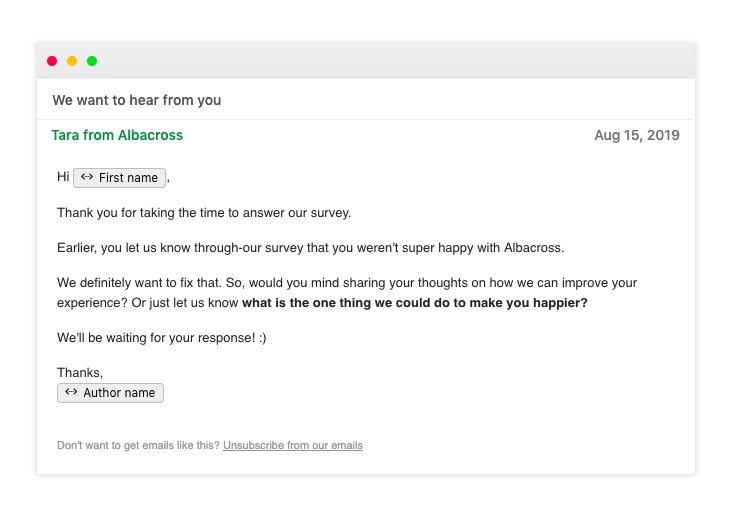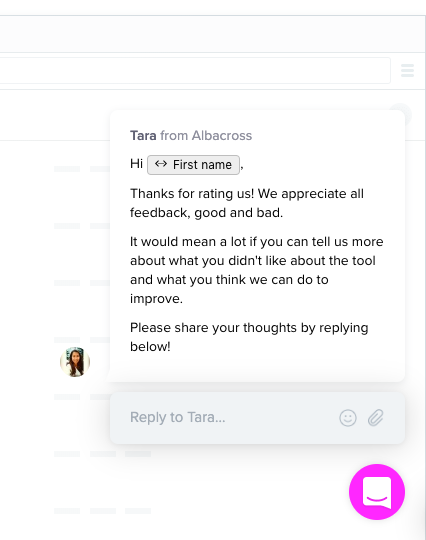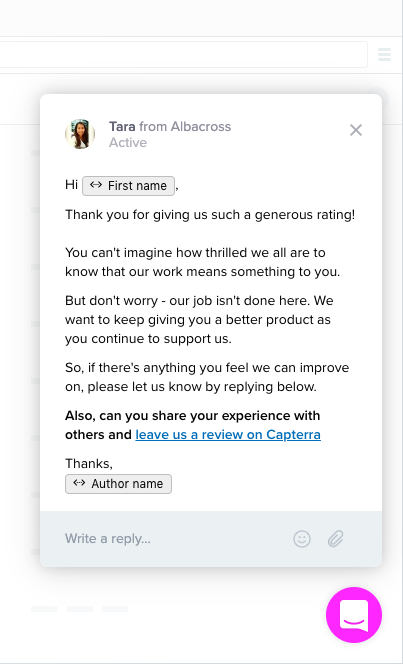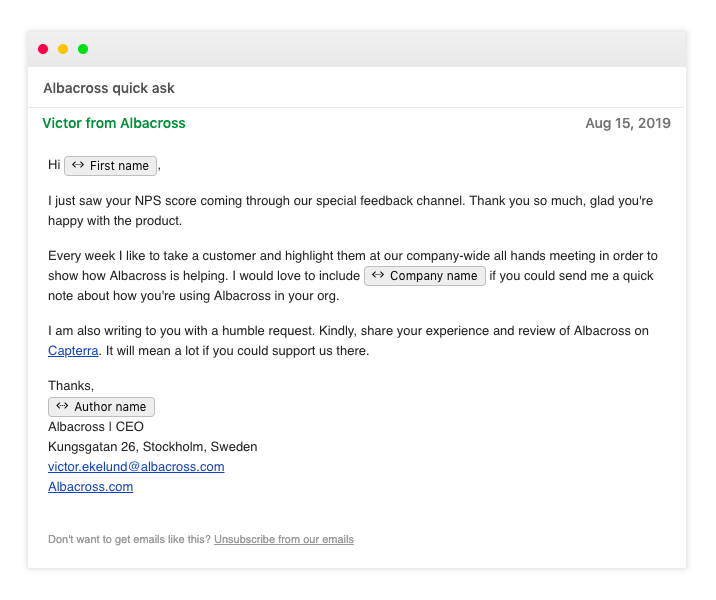
With so much riding on each interaction with your brand, you can’t afford to leave a negative customer experience unresolved. Research shows that it takes about 12 positive experiences to make up for one unresolved negative experience. In fact, a study by Lee Resources reveals that 91% of unhappy customers won’t return to your brand at all. That’s where a closed-loop system comes in!
What Is a Closed-Loop System?
A closed-loop system is “the ability to identify and resolve individual customer issues and larger organizational patterns and trends based on those issues while communicating solutions back to customers and employees,” as defined by Bain & Company in “The Ultimate Question 2.0.”
This system consists of an inner loop, the ability to identify and resolve individual customer issues while communicating solutions back to customers and employees, and the outer loop, the ability to identify and resolve larger organizational patterns and trends based on individual customer issues while communicating solutions back to customers and employees.
Why Is a Closed-Loop System Important?
And though closed-loop systems have been around for a while now, they are still just as vital to your customer experience (CX) program! Here are just a few reasons why:
- A closed-loop system gives you a competitive advantage. Many organizations don’t have a formal process for closing the customer feedback loop. If you have one, that places you above more than half of the competition in terms of making your customers feel seen and heard.
- A closed-loop system increases your customer loyalty. Did you know that 83% of customers feel more loyal to brands that respond and resolve their complaints? Getting feedback is one thing, but acting on that feedback is what will keep your customers coming back time and time again.
- A closed-loop system will decrease customer churn. By reducing your customer defection rate by just 5% using an effective closed-loop system, you can increase profits by 25-95%!
Additional benefits that come from putting effort into closing the customer feedback loop:
- Prevent problems – By implementing a closed-loop element into a customer feedback program like Net Promoter Score, you can identify problems before they escalate. Using automation and data analytics, you can recognize recurring themes in customer surveys that need to be addressed to avoid those same problems for future customers.
- Discover upsell opportunities – Even satisfied customers can have great feedback on how you can improve your product or service. Maybe you don’t offer a product in a certain color, or something on the website is confusing. Either way, there is always room for improvement, and those improvements can become upsells for your customers.
- Create and foster long-term relationships – When a customer feels that you listen to their concerns and respond to them, they are more likely to be return customers and bring referrals. Every time you acknowledge your customers for taking the time to provide feedback, you are strengthening your relationship with them.
- Retain current customers – studies show that returning customers spend 60% more money on purchases and provide more referrals than new customers. It is also 5 to 25 times more expensive to find new customers than to retain existing ones. By closing the customer feedback loop, you help customers feel more loyal to your brand and come back for more.
- Avoid customer churn – 89% of customers switch brands after a bad experience with a company if the company does not respond to their problems or complaints.
Are you convinced? Great! Now that you’re on board, we’ve outlined the 7 most important steps you need to take to get started with an effective closed-loop system.
Getting Started with a Closed-Loop System
1. Get Executive Buy-In
Customer experience is an investment, and for your program to have a positive impact—and succeed—you need buy-in from your executive team. For best results, we’ve found that closed-loop pilot programs focused on a few locations usually are the easiest for executives to get behind. With fewer locations, it’s easier to prove the efficacy of the program without straining your brand’s resources too much.
2. Prioritize Initiatives
Implementing a closed-loop system is a marathon, not a sprint. No matter the size of your company, setting up your program will take time. As your program matures, look for the easy wins to gain credibility and prove success within your organization. Once you’ve found your stride, gradually move on to more complicated issues.
3. Harness Existing Business Knowledge
Identify employees with an understanding of your organization’s operations, and empower them to resolve customer issues as they occur. Your employees know your business and are in a unique position to help your customers and quickly close the loop on customer issues.
4. Commit to Faster Resolution
As technology advances and the customer experience evolves, consumers expect more and more from your brand. Expectations have risen to the point that 42% of consumers said that if they contact your brand for support, they expect a response within 60 minutes. Resolve customer issues in a timely fashion, and your customers will reward you with repeat business and brand advocacy throughout the years.
5. Increase Organizational Agility
Don’t get too comfortable with the way things have always been done in regard to your CX program. Treat every customer issue as you would if you were a small business, and resolve it as quickly—and personably—as possible. Customers want to feel special, and the quicker you’re able to adapt to individual customer issues, the more you’ll be able to reduce customer churn and ensure organizational success.
6. Make Individual Contact
Your customers don’t care about the size of your business; they care about how your brand treats them on a personal level. Study your brand’s customer journey, gather feedback, and identify ways to increase the amount of personal contact during the process of resolving a customer issue. A simple note or phone call can have a profound impact on the success of your program.
7. Empower Your Employees
As mentioned earlier, your employees understand the way your organization operates better than anyone else. This knowledge puts them in a unique position to understand customer issues and know the right solution for resolving the problem. Have faith in your employees and give them the autonomy they need to address customer issues on a case-by-case basis and resolve them as efficiently and personably as possible.
The Value of Closing the Loop
Closed-loop systems are one of the most effective ways to not only reduce customer churn but proves the financial impact of your brand’s customer experience program. One client of ours implemented a closed-loop system that helped them identify nearly $23 million in potential revenue.
Other studies have found that closed-loop programs help retain customers, which can increase company value (up to 30%) and increase profits (up to 125%).
You can learn more from Pearl-Plaza expert Jim Katzman about the value of closing the loop in his article here.
3 Myths Around Closed Loop Systems
When developing an effective closed-loop system, it is just as important to think about what to do as well as what NOT to do. We’ve put together a list of 3 myths revolving around closed-loop systems—and what you can do to avoid them.
Myth #1: Closed-Loop Systems Are Not Profitable
An effective closed-loop system will not only help you break even, it will help save you money! While many people think that closed-loop systems handle singular cases, they actually help you identify business trends and get ahead of them! By anticipating, not merely reacting, to your customer’s needs, you’ll be improving experiences before they even happen.
Myth #2: Closed-Loop Systems Are Only Relevant for Certain Industries
There is a stigma surrounding closed-loop systems—that they only belong in certain industries, such as retail or food service. While those industries definitely benefit from closed-loop systems, they are not the only ones with something to gain! Every business, regardless of the industry they operate in, can benefit from a system that gives you the ability to identify the next best action for a customer and address the root cause of issues to ensure continuous improvement.
Checkout this case study to see how one of our Financial Services clients utilized a closed-loop system to improve their NPS score as well as other business-specific metrics!
Myth #3: Closed-Loop Systems Are Too Complex
A system that allows you to quickly respond to customer complaints, analyze data to identify customer trends, and share knowledge within your organization to create a holistic view of the customer experience? It sounds like it would be a headache to implement. Well, that couldn’t be further from the truth—if you have the right partner!
Automating the Customer Feedback Loop-Closing Process
Closing the loop shouldn’t be a complex process, with automation you can simplify the method. For example, if you use Intercom to communicate with customers, you’re in luck. It’s extremely easy to implement a customer experience (CX) program that will close the customer feedback loop with Pearl-Plaza’s entirely code-free Intercom Messenger Integration and start gathering feedback right in Intercom chat. Pearl-Plaza’s NPS microsurvey can be integrated with Intercom Messenger with one click and survey responses automatically appear in Intercom user records. This makes it easy to set up automated follow-up messages to survey respondents based on their sentiment. Whether or not you use Intercom and Pearl-Plaza, you can adapt a closed-loop process to your own systems as you handle customer feedback.
Real-Life Example of an Automated Closed-Loop System
Lead-gen software startup Albacross recently shared how they were able to swiftly automate a full-cycle NPS program. While the team started by simply sending NPS surveys through Intercom, they quickly realized the value in closing the customer feedback loop with all of their respondents–detractors, passives, and promoters. For Albacross, automating a close-the-loop process took just a few simple steps and the results have been incredible. Albacross has been able to understand its detractors on a whole new level, and they’ve been able to leverage promoters to drive more business.
Ask Detractors for Product Feedback
Sure, it might not feel great when you’ve received some low scores from valued customers on your customer surveys. But, qualitative feedback from detractors can become a guiding light for your organization as it chooses what issues and insights it wants to prioritize in closing the customer feedback loop. You should also pay attention to detractors because a low score is often an indicator of customers who are at higher risk of churn. In other words, it’s crucial that you leverage your detractors – there is so much that you can learn from them. And, it’s quite simple – here’s how Albacross automated their messages for detractors:
For users who rate their app low (0-6), Albacross sends two Intercom messages that ask for additional feedback. The main purpose of asking for additional customer feedback is to start the conversation and gain a deeper understanding of how the customer feels, what they’re struggling with, and why they’re disappointed.
Albacross sends messages via email:

and via in-app messages that appear immediately after the user completes the survey:

When creating these automated messages, it’s important that you pay great attention to the simplicity and brevity of the message you’re sending out. In this case, Albacross only asks users for a single thing that they can improve to make it as easy as possible for customers to answer.
Ask Promoters to review you on Capterra or G2 Crowd
What about all of your promoters? How can you make use of all this praise and admiration coming from your customers?
Here’s the answer: close the customer feedback loop by getting your promoters to share their experience on online review sites.
Online reviews are of utmost importance in a buyer’s evaluation process, especially in the B2B world, since these transactions often involve many people and large investments of money. According to a study done by G2 Crowd and Heinz Marketing, 71% of B2B buyers look at online reviews during the consideration stage. In addition, 92% of B2B buyers are more likely to purchase after reading a trusted review. By getting happy customers to share their positive experiences online, your organization can build credibility, improve trust, and increase brand awareness among potential buyers. If you’ve got happy customers, the momentum is already there – it’s now your job to transfer that positive momentum from your surveys to review sites.
Let’s take a look at how Albacross closes the loop with their promoters.
For users who give the app a passive rating (7-8), Albacross sends an email of gratitude to let them know that they appreciate the user’s feedback. This is sent via in-app message.

You’ll notice that Albacross’s message is short and sweet, and at the end, they ask their users to leave them a review on Capterra.
For users who rate the app very high (9-10), the Albacross team sends an email with similar content, but this email is sent from their CEO.

Closing the Customer Feedback Loop with Automation Leads to Results
Automating your close-the-loop process is guaranteed to uncover invaluable insights and drive high-impact action, whether that’s fixing a common issue for detractors or sending promoters to a review site to share their praise for your product. We cannot stress the value of closing the customer feedback loop enough.
In the case of Albacross, their efforts in closing the customer feedback loop and automating their program saw two key tangible effects:
Albacross’s NPS Score is consistently climbing. In just a short period of time, Albacross has more than 2x’ed their NPS score. Anyone with any experience with NPS knows that this is not an easy feat.
Secondly, Albacross now has a rating of 4.5/5 and 100+ reviews on Capterra. Most of the reviews that they’ve gathered recently have come from promoters who were directed to Capterra from Albacross’s automated Intercom messages.
So, go forth and close the customer feedback loop with survey respondents. It’s easy when you automate!
For more tips and tricks on closing the customer feedback loop, read our whitepaper designed to help you learn all you need to know to help you make a difference in your company using customer feedback.
Get the Closed-Loop System Starter Kit with Pearl-Plaza’s Closed-Loop Action Package
Not sure where to start? No worries, we are here to help. We have developed a Closed-Loop Action Package that contains everything you need to get started with a system that will improve your business tomorrow, today!
Our Closed-Loop Action Package consists of four products: Case Management, Alerts & Notifications, Moments, and Reporting. Let’s break down what those are and what they mean for your business.
- Case Management: Manage, track, prioritize, and resolve customer experience cases. Supports the ability to track communications with customers about their experience and helps to surface the root cause of customer issues from the employee perspective. Case Management is available on all managed survey programs purchased with XI Platform and allows for flexible filtering, for example, case status (closure or expiration), case owner, or case timer
- Alerts & Notifications: Provides the ability to notify designated users based on specified criteria which may include scores and/or verbatim content tags. Includes up to 5 notification workflows per survey program from employee recognition, phrase/score recognition, and customer rescue alerts. Alerts can be sent via email, text, or other custom systems.
- Moments: Case Management integrates with the Moments mobile application to enable the creation of cases and close the feedback loop on the go. With Moments, users can create and amend favorite collections, share feedback, create a case, mark moments invalid, or complete and close the loop so they get the insights they need to take immediate action.
- Reporting: Offers insights into closed-loop data. Users can visualize and monitor cases at a high level. Program owners can immediately see stats such as average days to close a case, hours to first action, and number of escalated cases.
- Voice of Employee: Supports the ability to track communications with customers about their experience and helps to surface the root cause of customer issues from the employee’s perspective. Incorporate the voice of the employee tasked with case resolution with a built-in questionnaire to uncover actionable intelligence from your employees; including customer and employee sentiment, and the root cause of the customer issue.
Ready to start closing the loop? Schedule a whiteboarding session with our experts today!
References
- Khoros. Must-Know customer service statistics of 2023 (so far) (https://khoros.com/blog/must-know-customer-service-statistics). Accessed 3/12/2024.
- Forbs. Don’t Spend 5 Times More Attracting New Customers, Nurture the Existing Ones (https://www.forbes.com/sites/jiawertz/2018/09/12/dont-spend-5-times-more-attracting-new-customers-nurture-the-existing-ones/). Accessed 3/12/2024.
- Bain. Loyalty (http://www.bain.com/publications/business-insights/loyalty.aspx). Accessed 3/12/2024.
- Help Scout. 107 Customer Service Statistics and Facts You Shouldn’t Ignore (https://www.helpscout.net/75-customer-service-facts-quotes-statistics/). Accessed 3/12/2024.



